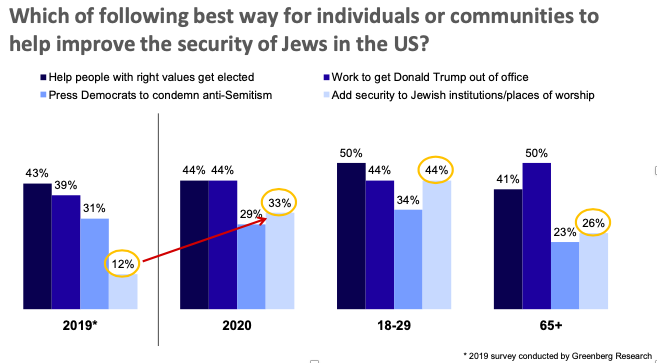On behalf of the non-partisan Jewish Electorate Institute (JEI), Garin-Hart-Yang conducted an online survey of 1,001 Jewish voters nationally who self-identify as Jewish and indicate that they are likely to vote in the November 2020 election. The survey, which was conducted from February 18 to 24, 2020, has a margin of error of ±3.2 percentage points. JEI has conducted two other national surveys among Jewish voters (in 2018 and 2019), and it used the findings of those surveys to provide a baseline comparison of political preferences and views among the Jewish electorate.
Topline Analysis of the Data Regarding the Jewish Electorate
- A majority of Jewish voters identify as Democrats, and an overwhelming majority of Jewish voters disapprove of President Trump.
- Jewish voters support each of the leading Democratic candidates at essentially the same level in head-to-head match-ups against Donald Trump.
- A majority of Jewish voters view all of the leading Democratic candidates favorably.
- While Jewish voters remain strongly pro-Israel, Jewish voters prioritize domestic policy issues over Israel when asked which issues are most important to them in selecting a candidate.
- While nearly all respondents identify as “pro-Israel,” a majority also identify as critical of at least some of the current Israeli government’s policies.
- Jewish voters feel less secure than they did two years ago, and they hold President Trump responsible for their insecurity.
- A plurality of Jewish voters believe that the best way to improve the security of Jews in the United States is “helping people with the right values get elected.”
This memorandum presents the 11 key findings of the JEI survey.
1. A consistent majority of the Jewish electorate identify as Democrats. A consistent 25% of Jewish voters identify as Republicans, and a consistent +65% identify as Democrats. These numbers have not changed outside the margin of error since 2018.
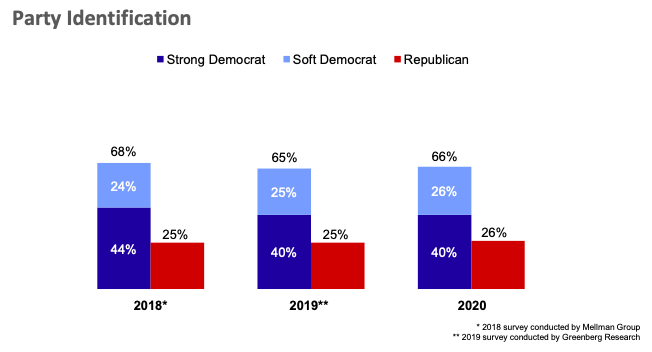
2. Jewish voters overwhelmingly disapprove of President Trump, with nearly three in five saying they strongly disapprove of Trump. These numbers have remained fairly consistent since he took office.
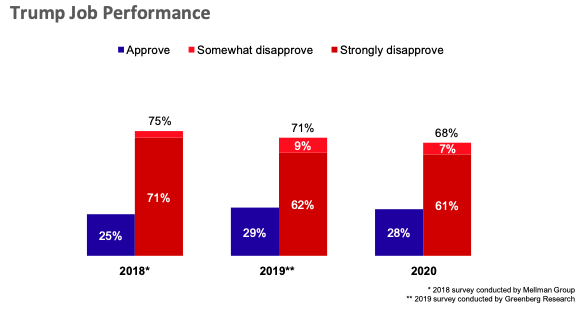
Jewish Democrats are overwhelmingly united against President Trump (6% approve, 93% disapprove), and while Jewish Republicans give President Trump more support (81% approve), 12% of Republicans say they disapprove.
3. Jewish voters are generally supportive of all of the leading Democratic candidates at nearly equal levels. While Joe Biden and Pete Buttigieg lead the favorability rating with 60% each, Bernie Sanders ranked last, with more than half (52%) still viewing him favorably. Bernie Sanders’s unfavorable rating (45%) among Jewish voters is more than 20 points lower than President Trump’s (68%).
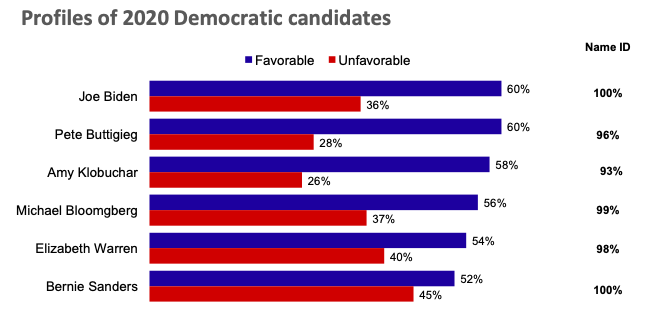
4. Two-thirds of Jewish voters say they will vote for a generic Democratic candidate over President Trump in the 2020 general election. These numbers are similar to when Trump is pitted against any of the actual Democratic candidates.
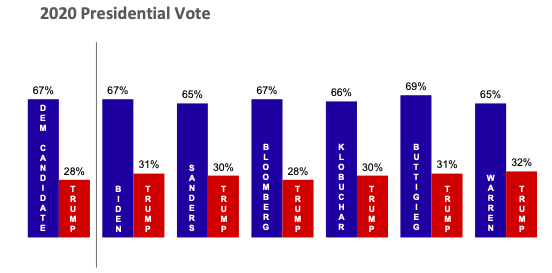
5. Despite uniform support for every Democratic candidate versus President Trump, Senator Bernie Sanders is a slightly more polarizing figure than his fellow Democratic candidates. Sanders has higher unfavorable ratings among some key subgroups, but he finds strong support among younger Jewish voters.
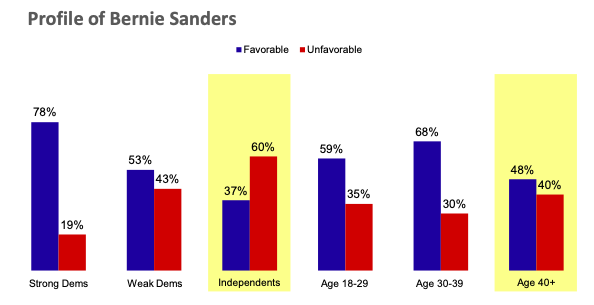
But, in keeping with Jewish voters’ overwhelming sentiment to vote out Trump, the Sanders vote in the trial heat looks fairly similar to the generic vote by these same subgroups:
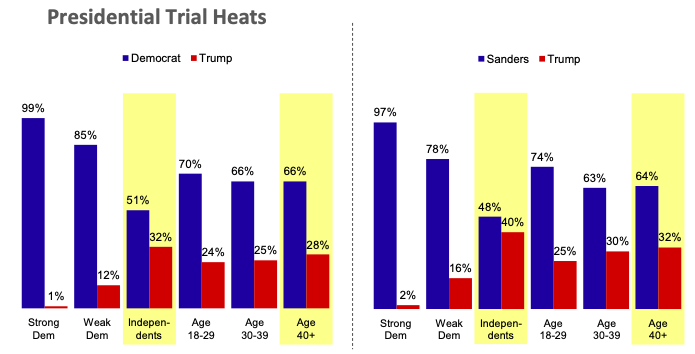
6. While there are some issues for which President Trump’s performance is viewed as favorable by a majority or plurality of Jewish voters, this is not translating into support for him. The polling data on Donald Trump’s electoral prospects among Jewish voters suggest that the issues on which a slim majority of Jewish voters have a favorable view (namely, those related to Israel) are not driving the Jewish vote.
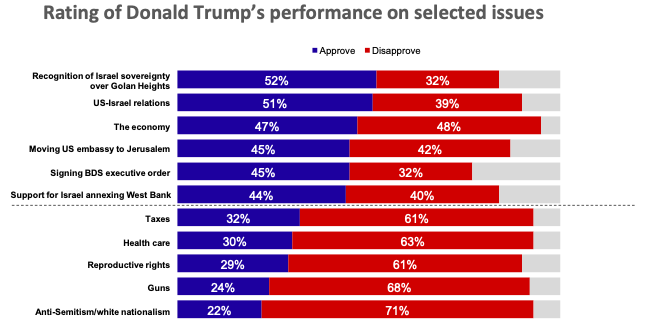
7. Domestic issues, particularly healthcare, Medicare, and Social Security, remain the top issues for Jewish voters. When asked about the issues that are most important when selecting a candidate, Israel remains the lowest priority for Jewish voters.[1]
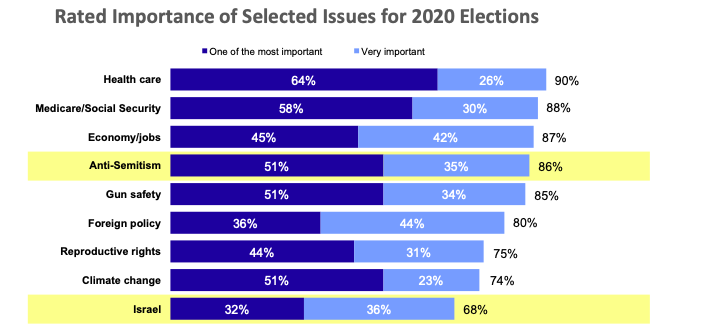
[1] These results are virtually identical to the 2019 polling, when we asked about Israel in a slightly different way: “How important will be a candidate’s position on Israel be for you personally in deciding who you will vote for in the November 2020 election?”
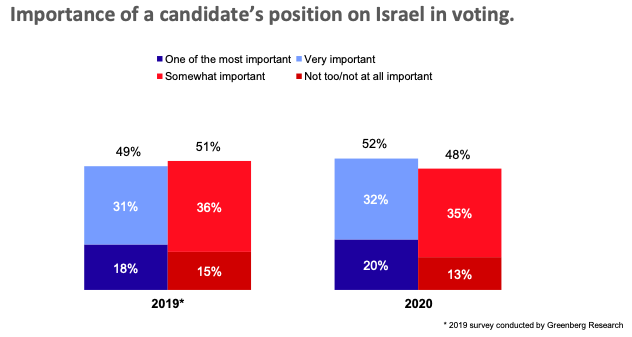
(Interestingly, there is little meaningful generational difference, as 21% of both Millennials and Jewish voters age 65 and older say that Israel is one of the most important issues to them.)
8. The low importance of Israel as a voting issue in 2020 does NOT mean a corresponding diminution of Jewish voters’ support for Israel. A near universal 91% of respondents surveyed describe themselves as generally pro-Israel, which is at the same high level as in the 2019 and 2018 surveys. While respondents are strongly pro-Israel, we find that 56% of the Jewish electorate are critical of at least some of the current Israel government’s policies.
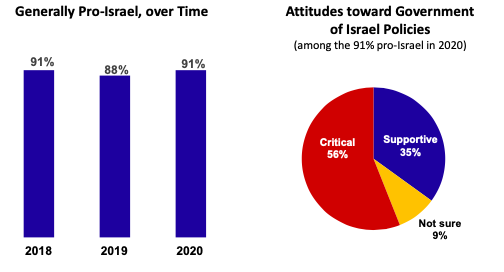
9. A substantial proportion of Jewish voters personally feel less safe than they did two years ago, and they believe that Jews in the United States are less safe than they were two years ago.
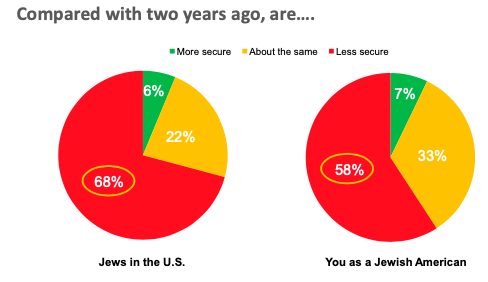
This is another finding in which there is little difference between demographic groups’ perceptions of insecurity in the Jewish community due to the rise of anti-Semitism: millennials feel less secure by 56% to 9%, which is not much different from voters age 65 and older (60% less secure, 3% more secure.)
10. President Trump’s disapproval ratings for issues are highest when it comes to his handling of anti-Semitism and white nationalism (71% of voters disapprove, including one-third of Republicans.) President Trump is viewed by a significant percentage of Jewish voters as part of the problem fueling the rise of anti-Semitism.
A plurality (45%) express concern about President Trump’s emboldening far-right extremists and white nationalists, a notable change since 2019. More than one in four Republican voters express concern about Trump’s actions and about “Republicans tolerating anti-Semitism” in their ranks:
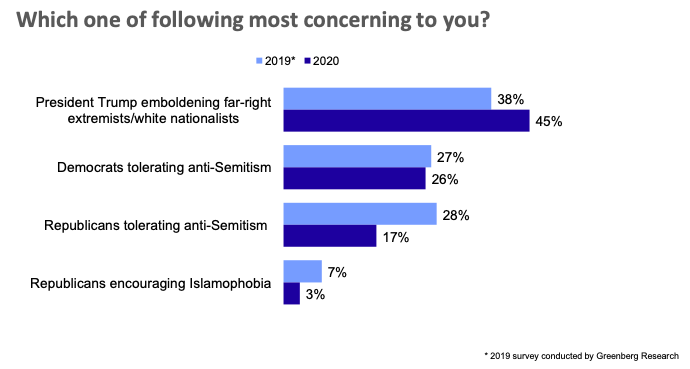
Similarly, President Trump and the GOP are viewed to some extent as contributing to rising anti-Semitism, and 56% of Jewish voters believe he is at least partially to blame for targeted attacks on synagogues:
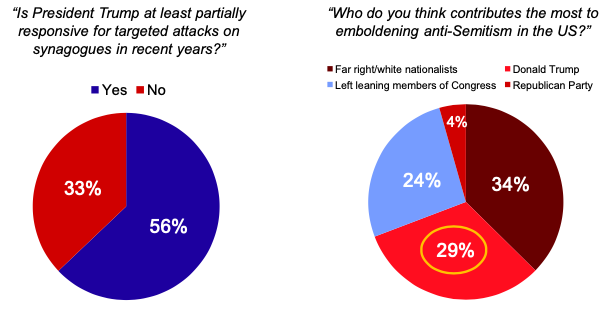
11. Jewish voters continue to channel their concern about issues, such as rising anti-Semitism, into political action, with virtually similar results by key demographics such as age, with a plurality of voters indicating that the best way to improve Jews’ security in the United States is by “helping people with the right values get elected.”
